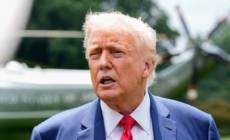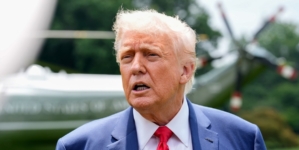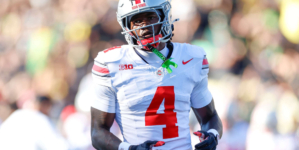-
Baron Davis says Paul Pierce is the greatest to come out of LA | All Facts No Breaks - 17 mins ago
-
Faced with 153 sex abuse cases, Fresno Diocese files bankruptcy - 20 mins ago
-
Giants Top Prospect Floated As Potential ‘Panic Button’ Trade Candidate - 25 mins ago
-
Trump says Israel agrees to ceasefire conditions in Gaza; no Hamas response yet - 57 mins ago
-
Bass says Trump is waging ‘an all-out assault’ against Los Angeles - about 1 hour ago
-
Ohio State Buckeyes’ Jeremiah Smith Doesn’t Hold Back About Julian Sayin - about 1 hour ago
-
Who Are the 10 Best QBs Heading Into the 2025 NFL season? - about 1 hour ago
-
‘Masked Singer’ judge Nicole Scherzinger flaunts physique at 47 in bikini - about 1 hour ago
-
L.A. 7-Eleven worker allegedly beaten by her boss will be taken off life support, family says - 2 hours ago
-
Orioles Utility Man Reportedly Out 8-12 Weeks With Hamstring Strain - 2 hours ago
China’s Xi Promises New Wave of Corruption Crackdown Amid Record Purges
President Xi Jinping of China has renewed his call to root out corruption, describing it as the most serious threat to the ruling Chinese Communist Party (CCP).
Newsweek reached out to the Chinese Foreign Ministry by email for comment.
Why It Matters
Xi launched a sweeping anti-corruption campaign after taking leadership of the CCP in 2012. Since then, probes have been launched into more than 4 million members of the 99-million-strong party, spanning low-ranking “fly” officials to high-ranking “tigers.”
Many observers have suggested that Xi, now in his historic third term, has used the anti-corruption crackdown to eliminate rivals and further entrench himself at the center of China’s political hierarchy.
What To Know
China’s top disciplinary agency began a three-day plenary session in Beijing on Monday to outline priorities for this year’s anti-corruption campaign.
Addressing attendees on Monday, Xi called corruption the “biggest threat facing our party.” While highlighting successes and what he called a “clearer understanding and firmer action on the major issue of self-revolution,” he pledged to continue “purifying cadres and forces.”
Wagner Meier/Getty Images
In 2024, the Central Committee, the CCP’s top decision-making body, initiated probes into 58 high-ranking “tigers,” according to Xinhua. Additionally, 433,000 lower-ranking “flies” were disciplined, with 14,000 referred for prosecution since April alone, it reported.
Prominent figures ensnared in the anti-corruption drive include former Foreign Minister Qin Gang and Li Shangfu and Wei Fenghe, the two defense ministers directly preceding the current occupier of that office, Dong Jun.
The fact that many of those purged have held senior roles in the People’s Liberation Army (PLA), including its Rocket Force—responsible for China’s nuclear arsenal—has raised questions about Xi’s control over the military and highlighted his mistrust of the organization.
What People Are Saying
Chinese President Xi Jinping, speaking in Beijing on Monday, promised to: “Intensify our efforts against corruption and eradicate the soil and conditions for the breeding of corruption.”
Andrew Wedeman, political science professor at Georgia State University told Reuters:
“I don’t see how Xi could afford to back off at this point. A dozen years after he set out to cleanse the senior ranks, Xi is still finding widespread corruption at the top of the party-state and the PLA.
“It would thus seem that the ‘pool’ Xi is drawing on to replace corrupt officials is also full of corrupt officials. If Xi is promoting corrupt officials, this suggests the party’s internal vetting apparatus is not functioning effectively or, more seriously, is itself corrupted.”
What’s Next?
Xi’s anti-corruption campaign shows no signs of slowing, with a particular emphasis on the military.
In November, Miao Hua, a member of the five-person, Xi-led Central Military Commission, became the latest high-ranking official targeted. Miao was suspended pending an investigation into “serious violation of discipline,” a phrase commonly used by the CCP to refer to corruption.
CNN recently reported the existence of 218 newly built or expanded facilities under the “liuzhi,” or “retention in custody,” system introduced in 2018. These centers have drawn criticism for their potential for abuse, as anyone in a position of “public power,” whether or not they’re a CCP member, can be detained for up to six months without access to legal counsel or family.
Source link
























